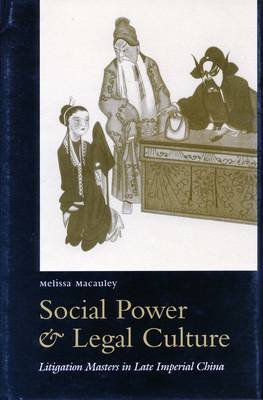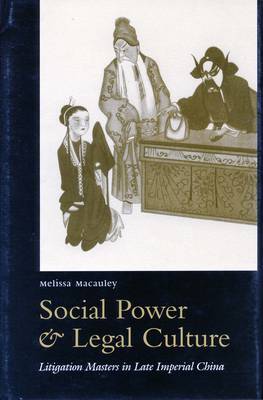
- Retrait gratuit dans votre magasin Club
- 7.000.000 titres dans notre catalogue
- Payer en toute sécurité
- Toujours un magasin près de chez vous
- Retrait gratuit dans votre magasin Club
- 7.000.0000 titres dans notre catalogue
- Payer en toute sécurité
- Toujours un magasin près de chez vous
Description
Asserting that litigation in late imperial China was a form of documentary warfare, this book offers a social analysis of the men who composed legal documents for commoners and elites alike. Litigation masters--a broad category of legal facilitators ranging from professional plaintmasters to simple but literate men to whom people turned for assistance--emerge in this study as central players in many of the most scandalous cases in eighteenth- and nineteenth-century China. These cases reveal the power of scandal to shape entire categories of law in the popular and official imaginations.
The author characterizes litigation masters as entrepreneurs of power, intermediaries who typically emerge in the process of limited state expansion to provide links between local interests and the infrastructure of the state. These powermongers routinely acted in the interests of the local elite and the male lineage. But cases preserved in criminal archives also reveal a clientele surprisingly composed of the subordinate actors in legal disputes--widows fighting in-laws and other men, debtors contesting creditors, younger brothers disputing older ones, and common people charging the rich. Challenging earlier scholarship claiming that the Chinese legal system simply maintained the hegemony of elites and the patriarchal order, this study shows how the legal tools of domination were often transformed into weapons of social resistance and revenge.
The book also examines the manifold ways in which legal practice, Confucian ideology, and popular entertainments like opera and storytelling coalesced into Chinese legal culture. Popular traditions in particular did not simply reflect legal culture but actively influenced it, shaping common presumptions about law that transcended differences of class and region. Exploring Chinese legal culture in the structural contexts of commercialization, changes in property transactions, and ineradicable litigation backlogs, the author explains why litigation was condemned by all classes of Chinese men and women even as all classes litigated.
Spécifications
Parties prenantes
- Auteur(s) :
- Editeur:
Contenu
- Nombre de pages :
- 436
- Langue:
- Anglais
- Collection :
Caractéristiques
- EAN:
- 9780804731355
- Date de parution :
- 01-12-98
- Format:
- Livre relié
- Format numérique:
- Genaaid
- Dimensions :
- 160 mm x 236 mm
- Poids :
- 725 g

Les avis
Nous publions uniquement les avis qui respectent les conditions requises. Consultez nos conditions pour les avis.






